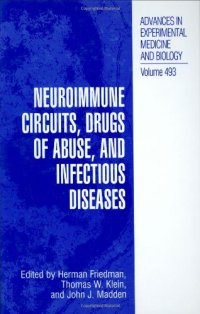
Ebook: Neuroimmune Circuits, Drugs of Abuse, and Infectious Diseases
Author: Phillip K. Peterson Genya Gekker (auth.) Herman Friedman Thomas W. Klein John J. Madden (eds.)
- Tags: Neurology, Public Health/Gesundheitswesen, Virology, Infectious Diseases, Pharmacy
- Series: Advances in Experimental Medicine and Biology 493
- Year: 2002
- Publisher: Springer US
- Edition: 1
- Language: English
- pdf
Introduction and Perspectives This volume is based on the proceedings of the 7th annual symposium on the topic Neuroimmune Circuits, Infectious Diseases and Drugs of Abuse, Bethesda, Maryland, Oc- ber 7–9, 1999. This symposium, as in the past, focused on newer knowledge concerning the relationship between the immune and nervous systems with regards to the effects of drugs of abuse and infections, including AIDS, caused by the immunodeficiency virus. Presentations discussed the brain-immune axis from the viewpoint of drugs of abuse rather than from the subject of the brain or immunity alone. The major aim of this series of conferences has been to clarify the consequences of immunomodulation induced by drugs of abuse in regards to susceptibility and pathogenesis of infectious diseases, both in man and in various animal model systems. The recreational use of drugs of abuse such as morphine, cocaine, and marijuana by large numbers of individuals in this country and around the world has continued to arouse serious concerns about the consequences of use of such drugs, especially on the normal physiological responses of an individual, including immune responses. Much of the recent data accumulated by investigators show that drugs of abuse, especially opioids and cannabinoids, markedly alter immune responses in human populations as well as in experimental animals, both in vivo and in vitro.
This volume focuses on the relationship between the nervous and the immune system with regard to the effects of drugs of abuse and infections, including infection caused by the immunodeficiency virus which causes AIDS, the number one health problem worldwide. Chapters focus on the brain-immune axis, detailing the effects of drugs of abuse. It is well known that recreational drugs of abuse such as morphine, cocaine, and marijuana, as well as other drugs, including the legal drugs alcohol and nicotine, are used by large numbers of individuals. Serious concerns have been raised about the consequences of using such drugs, especially in relation to their effects on normal physiological responses, including immune mechanisms. It is now widely recognized not only that many drugs of abuse have serious consequences on normal parameters of neurologic and neuroendocrine systems in general but also that effects on those systems, in turn, may affect indirectly immunity and also directly affect immune systems. Much data has now been accumulated showing that drugs of abuse markedly alter the immune response in human populations as well as in experimental animals, both in vivo and in vitro. Furthermore, studies on microbial infections have shown that many drugs of abuse are associated with increased susceptibility to infectious diseases, especially opportunistic intracellular microorganisms, including viruses such as HIV which causes AIDS. The mechanisms whereby drugs of abuse increase the likelihood of infections by opportunistic microorganisms in humans as well as in experimental animals are delineated. This volume will further the understanding of the impact of drugs of abuse on the brain-immune axis and its relationship to immunomodulation and infection, especially that caused by the AIDS virus.